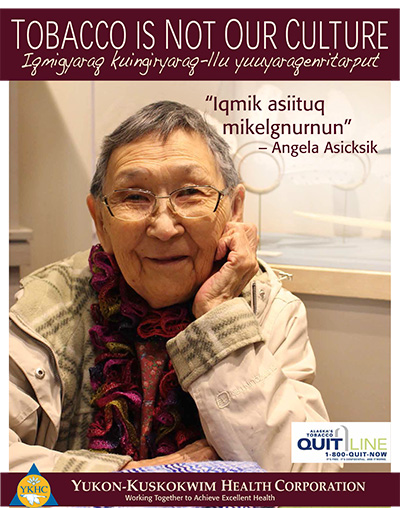Tobacco-Free Alaska > Community Spotlight > February 2015
February Community Spotlight: Successes in the YK Delta
 The Yukon-Kuskokwim Health Corporation (YKHC) based in Bethel, Alaska, covers a vast region, an area larger than half of the states in the nation. Though the corporation covers a large land area, only about 2 percent of the Alaska population lives there. Ayodele Obashoro, program manager for YKHC’s Nicotine Control & Research, says, “Bethel is a small community where everyone knows everyone.”
The Yukon-Kuskokwim Health Corporation (YKHC) based in Bethel, Alaska, covers a vast region, an area larger than half of the states in the nation. Though the corporation covers a large land area, only about 2 percent of the Alaska population lives there. Ayodele Obashoro, program manager for YKHC’s Nicotine Control & Research, says, “Bethel is a small community where everyone knows everyone.”
At 33 percent, adult tobacco use in the region is higher than national and state averages, making the Nicotine Control & Research Program an important part of YKHC supporting its mission of “working together to achieve excellent health.”
Tobacco‐Free Tribal Resolutions: Making Connections
In the last few months, the momentum for supporting tobacco‐free public places has grown. Ayo credits the success of having 40 out of 56 federally recognized tribes in the YK Delta sign smokefree or tobacco‐free resolutions to personal, consistent contact. This is in a region where some villages are accessible only by plane, or snowmachine in winter. Meeting face‐to‐face is expensive and sometimes logistically unworkable. Despite that or perhaps because of the isolation, it’s important to connect with villagers. Ayo says it really helps having staff on the Nicotine Control & Research Program who come from the region and know people in the area. Nikki Corbett and Josephine Guy both work in the program. They grew up in the YK Delta and their efforts and understanding of the culture are beneficial in connecting with Tribal Administrators.
Last year, YKHC and other southwest organizations (BBAHC and APAIA) printed joint ads in local newspapers thanking tribes who signed resolutions. Ayo said that it was easier to talk to tribal administrators after the ads. Since they had seen them, they understood more about the resolutions and they could contact tribes who had signed. Because travel in the region is so expensive, usually first contact is made over the phone and then followed up consistently with additional phone calls and sometimes personal presentations in villages.
Incorporating Tradition
Connecting with the community has been vital to YKHC’s nicotine-‐use prevention and cessation successes. In a series of posters asserting “Tobacco Is Not Our Culture,” local residents are featured doing everyday activities and promoting healthy lifestyle choices—anti‐tobacco choices. Participants are encouraged to share why they quit tobacco or what they do instead of smoke.
Ayo doesn’t see the small town nature of Bethel as an obstacle. Because “everyone knows everyone,” people networks are utilized to gather support, from attending fun runs for “World No Tobacco Day,” to helping out with annual berry picking festivals.
